 |
|
|
 |
 |
 |
Breed Profile
--Written By Patty Govoni and Tiami L. Coleburg

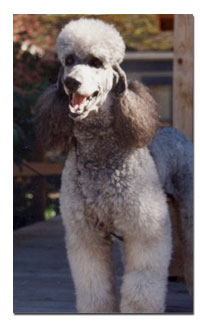 Breed: Breed:
Poodle
Owner Level:
Some Dog Experience Helpful
Average Life Span:
12 to 15 years
Average Weight and Height: The Poodle comes in three sizes that are recognized by the A.K.C.- Standard is over 15 inches at the highest point of the shoulders.
- Miniature is 15 inches or under at the highest point of the shoulders, with a minimum height in excess of 10 inches.
- Toy is 10 inches or under at the highest point of the shoulders.
Color And Coat:
The poodle coat is Curly and has a naturally harsh texture and should be dense. Poodles come in many solid colors. The most common colors are white, black and brown. Other colors approved by A.K.C. are blues, grays, silvers, browns, cafe-au-laits, apricots, creams. Brown and cafe-au-lait Poodles have liver-colored noses, eye-rims and lips, dark toenails and dark amber eyes. Black, blue, gray, silver, cream and white Poodles have black noses, eye-rims and lips, black or self colored toenails and dark eyes. In the apricots while the before stated coloring is preferred, liver-colored noses, eye-rims and lips, and amber eyes are allowed. Teeth should have a scissor bite.
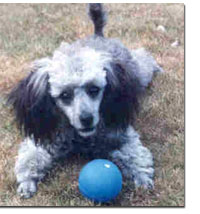 Grooming: Grooming:
The fancy hairstyles seen in the show ring are a result of the poodle's bird hunting history, when hunters needed to hunt to survive. The chest was left long to keep the body warm and protected. The rear was shaved to help maneuverability in the water. The pompoms on the legs and hips were for protection and provided insulation from the cold water on the joints.
Pet Poodles are easiest kept in a regular pet clip which is shorter and easier to manage. Their coat is high maintenance and does require brushing several times a week. While they don't shed like other dogs they do lose their hair and it is retained in their coat. These hairs will soon turn into felt-like mats if not tended to on a regular basis. Their ear canals have a tendency to become infected because of lack of air flow combined with hair that will actually grow down into their ear canal. This hair may need to be plucked and ears cleaned regularly.
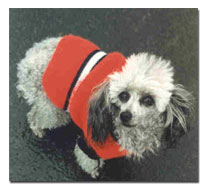 Grooming can be done at home if the right equipment is used and the owner is willing to take lessons from someone that knows how to groom a poodle. Some things to consider before home grooming: equipment cost, challenge of trimming a wiggly dog, the danger of sharp scissors, years of practice need to perfect grooming skills. Grooming can be done at home if the right equipment is used and the owner is willing to take lessons from someone that knows how to groom a poodle. Some things to consider before home grooming: equipment cost, challenge of trimming a wiggly dog, the danger of sharp scissors, years of practice need to perfect grooming skills.
The cost of grooming a poodle, by a professional, every 6 to 8 weeks costs approximately $25 to $65 depending on the poodle's size and condition of coat. A matted poodle that has not been regularly brushed at home by its owner will take much longer to have groomed. In some cases a matted poodle will need to be shaved short all over. This makes more sense than to make the poodle suffer by yanking and pulling on his coat with a comb trying to remove mats. Regular brushing a consistent clipping grooming schedule will prevent that issue from occurring.
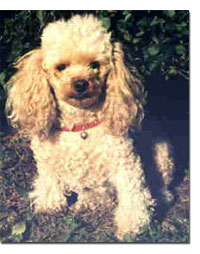 Typical Health Problems: Typical Health Problems:
While well-bred Poodles make excellent pets, we must also discuss poorly bred Poodles and the problems they can have. They may be neurotic, high strung, fearful and aggressive and are often at a greater risk for developing hereditary or genetic disease. Progressive Retinal Atrophy or PRA causes total blindness and cannot be treated. Another problem is bloat, seen in Standard Poodles. It is a rapid accumulation of air in the stomach that causes the stomach and adjacent organs to flip. This stomach flip can cut off the blood supply to the stomach, heart and other organs. If not treated immediately the dog can die. Congenital epilepsy is another problem. There isn't a cure for this but it can be controlled somewhat with medication. Hip dysphasia can be a problem in the Standard Poodle.
Personality:
The Poodle is the national dog of France, but it origins are believed to have begun in Germany. The Poodle was originally created as a water retriever to assist in the hunting of water fowl.The modern day Poodle has evolved into three sizes. The Standard and Miniature are in the non-sporting group and the Toy is in the toy group. They differ only in size. The breed Standard for the Poodle is the same for the Standard, Miniature and Toy varieties except in regards to heights. Personalities are generally consistent within all the sizes. Well-bred Poodles are highly intelligent, calm and athletic. They are very good watch/alert dogs. They are very sturdy dogs, making them a great candidate for agility work and as therapy dogs. They are very versatile and adaptive breed. Overall, the poodle can be your perfect companion, they are wonderful dogs. They are sensitive and learn quickly. They are very eager to please their owner.
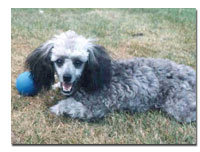 Why are these dogs typically in animal shelters? Why are these dogs typically in animal shelters?
These dogs arrive at shelters for many reasons. Often, owners are not prepared for the intelligence level of the dog. This creates behavior issues when the owner does not give the dog a correct life and training plan. Boredom, lack of socialization and training can create barking, behavior and aggression issues. Other common reasons are the Owner's moving, owner going to nursing home or owner passed away. Many poodles arrive at shelters in neglected condition. Owners are not prepared, willing or able to deal with the needed care this breed demands. The most common problems seen are related to grooming. Ear, nail, and teeth care have been neglected and in some cases can be shocking. With time and effort these dogs can generally be bought to good health again. Most of the Poodles seen in shelters arrive due to human factors and/or failings.
How do these dogs handle rescue or shelter life?
Rescue Poodles will do well in a new home that can give them the structure they may not have ever had. They will react differently as individuals to the shelter environment. Some dogs may show fear in the shelter. However, these dogs should be removed from that environment to get an accurate read on temperament. If removed from that shelter environment, they often settle quickly into a stable and loving companion animal. This adjustment may not always occur. But, one should not assume, based on shelter behavior that the dog with fear issues is un-adoptable, until tested outside that shelter. Foster care is recommended for those dogs that show some degree of stress or fearful behavior.
Who should own this breed?
Owners should have some dog experience. Poodles are very smart and need direction. They are a challenge to train because of how smart they are. Their intelligence shouldn't be held against them. Owners should realize their coat care is high maintenance and must be tended to regularly.
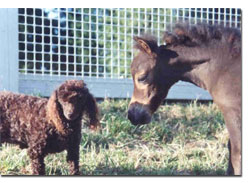 Is this breed good with children? Is this breed good with children?
In general, yes. They are often good with children and other pets in the household, if socialized and treated properly. Each individual dog's temperament and the child's animal interaction skills, must be considered when choosing a family dog. Every dog should be look at as an individual personality. Children and dogs should never be left alone and unattended, even for a moment. Young children do not have proper dog etiquette, and dogs often do not understand a child's behavior. This can result in tragedy with any breed of dog.
Is this breed good with other dogs in general?
Most Poodles are good with other dogs. They love to play and show off, trying to outsmart (and are usually successful) their playmates.
How easy is training and house training with this breed?
The Poodle excels at obedience. They love to work and please their owner. They are usually easy to housebreak if done properly. Any dog can have a bad start at being housebroken. It is good to start your housetraining from the beginning no matter what age you get a Poodle. Praise when they go potty outside, supervise inside activity and set them up to win. Using a crate when you cannot be with them indoors is a good idea. Training that is fair, firm and consistent will give you great success with your Poodle.
Socializing this breed?
This breed needs to be exposed to a large variety of life experiences to develop good judgment. The un-socialized Poodle can develop fear tendencies and display aggressive or unconfident behavior. As with most breeds, on going socialization is a key to success. |
|

